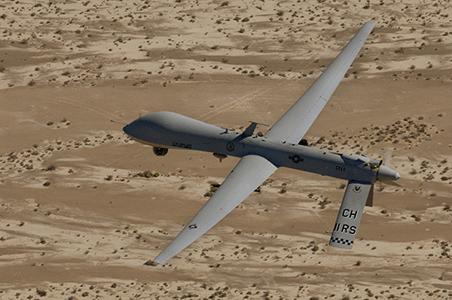Killer Robots on the Agenda
May 20, 2014
Robots with the ability to kill without human input were the focus of a recent United Nations conference in Geneva, Switzerland. Representatives from 87 countries attended the first-of-its-kind conference to discuss the emergence of Lethal Autonomous Weapons Systems (LAWS). Killer robots have long been a staple of science fiction, and in such popular film series as The Terminator, evil robots seek the extinction of all human life. Representatives at the UN did not consider such apocalyptic scenarios, instead focusing on near-term applications and problems that might realistically arise. The experts discussed how to define a truly autonomous robot and the technology needed to develop such systems. They also discussed the potential benefits of deploying killer robots in military operations and the potential ethical and legal issues of using such robots at all.

A drone, such as this U.S. MQ-1 Predator drone, has no pilot, but a human does have to launch the weapon. Lethal Autonomous Weapons Systems act without input from a human operator (Master Sgt. Scott Reed, U.S. Air Force).
Robotic weapons systems are already wielded by military and intelligence agencies. Unmanned aerial vehicles, popularly called drones, have killed thousands of people in Afghanistan, Pakistan, and Yemen. However, drones are not fully autonomous. While these sophisticated aircraft can often navigate or lurk above an area without human input, only a human operator can launch their weapons.
That limitation may change in the near future. Advanced cameras with tracking and facial recognition software may soon make it easy for robots to pick out targets without human guidance. Attaching a gun or a missile launcher to such a system would be trivial. In March, Russia announced that it was developing an autonomous tank-like robot to guard its ballistic missile sites and automatically attack intruders. Most government representatives at the meeting argued that humans must remain in control of any decision to take a human life. Only five countries—Cuba, Ecuador, Egypt, Pakistan, and Vatican City—called for an outright ban on lethal autonomous robots.
Additional World Book articles:
- Military aircraft (Special-mission aircraft)
- Biometric Identification: Is That Really You? (a Special Report)


